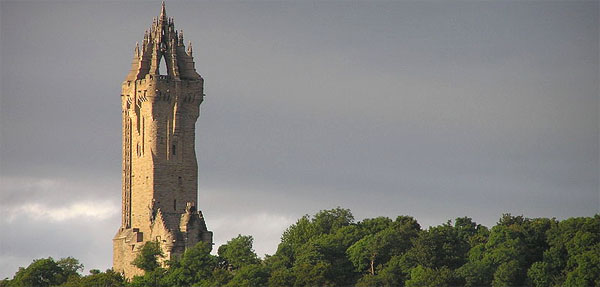ADVERTISEMENT
|
|
|
Scotland Travel & Tourism Guide
Scotland History - Medieval Period
NextGen Day feature Asia links, Asia resources and large selection of Asia budget airlines, Asia chartered planes, Asia sea cruises, Asia ferries, Asia travel agencies, Asia land transports and Asia attractions including Asia beaches, Asia medical tourism, Asia retirement homes, Asia historical and Asia pilgrimage tours. NextGen Day offers travel tips and information for top travel places and best destinations in Africa, Asia, Australia, Europe, Middle East and United States of America.

The Wallace Monument commemorates William Wallace, the 13th-century Scottish hero.
The Kingdom of the Picts was the state which eventually became known as "Alba" or "Scotland". The development of "Pictland", according to the historical model developed by Peter Heather, was a natural response to Roman imperialism. Another view places emphasis on the Battle of Dunnichen, and the reign of Bridei m. Beli (671–693), with another period of consolidation in the reign of Óengus mac Fergusa (732–761). The Kingdom of the Picts as it was in the early 8th century, when Bede was writing, was largely the same as the kingdom of the Scots in the reign of Alexander (1107–1124). However, by the tenth century, the Pictish kingdom was dominated by what we can recognise as Gaelic culture, and had developed an Irish conquest myth around the ancestor of the contemporary royal dynasty, Cináed mac Ailpín.
From a base of territory in eastern Scotland north of the River Forth and south of the River Oykel, the kingdom acquired control of the lands lying to the north and south. By the 12th century, the kings of Alba had added to their territories the English-speaking land in the south-east and attained overlordship of Gaelic-speaking Galloway and Norse-speaking Caithness; by the end of the 13th century, the kingdom had assumed approximately its modern borders. However, processes of cultural and economic change beginning in the 12th century ensured Scotland looked very different in the later Middle Ages. The stimulus for this was the reign of King David I and the Davidian Revolution. Feudalism, government reorganisation and the first legally defined towns began in this period. These institutions and the immigration of French and Anglo-French knights and churchmen facilitated a process of cultural osmosis, whereby the culture and language of the low-lying and coastal parts of the kingdom's original territory in the east became, like the newly acquired south-east, English-speaking, while the rest of the country retained the Gaelic language, apart from the Northern Isles of Orkney and Shetland, which remained under Norse rule until 1468.
The death of Alexander III in March 1286, followed by the death of his granddaughter Margaret, Maid of Norway, broke the succession line of Scotland's kings. This led to the intervention of Edward I of England, who manipulated this period of confusion to have himself recognised as feudal overlord of Scotland. Edward organised a process to identify the person with the best claim to the vacant crown, which became known as the Great Cause, and this resulted in the enthronement of John Balliol as king. The Scots were resentful of Edward's meddling in their affairs and this relationship quickly broke down. War ensued and King John was deposed by his overlord, who took personal control of Scotland. Andrew Moray and William Wallace initially emerged as the principal leaders of the resistance to English rule in what became known as the Wars of Scottish Independence. The nature of the struggle changed dramatically when Robert de Brus, Earl of Carrick, became king. War with England continued for several decades, and a civil war between the Bruce dynasty and their long-term Comyn-Balliol rivals, the flashpoint of which could be traced to the slaying in a Dumfries church of John 'the Red' Comyn of Badenoch by Bruce and his supporters, lasted until the middle of the 14th century. Although the Bruce dynasty was successful, David II's lack of an heir allowed his nephew Robert II to come to the throne and establish the Stewart Dynasty. The Stewarts ruled Scotland for the remainder of the Middle Ages. The country they ruled experienced greater prosperity from the end of the 14th century through the Scottish Renaissance to the Reformation. This was despite continual warfare with England, the increasing division between Highlands and Lowlands, and a large number of royal minorities.
Source: Wikipedia Encyclopedia
Hotels, Vacations & Holidays in Scotland, Europe
<1> <2> <3> <4> <5> <6> |

